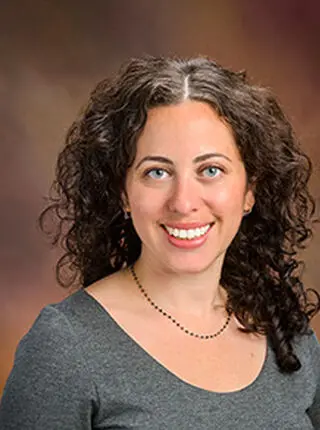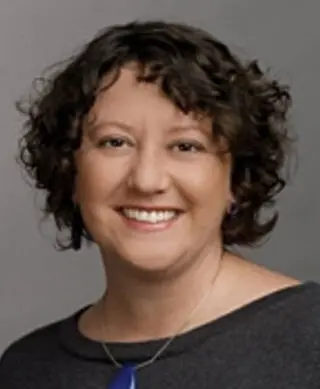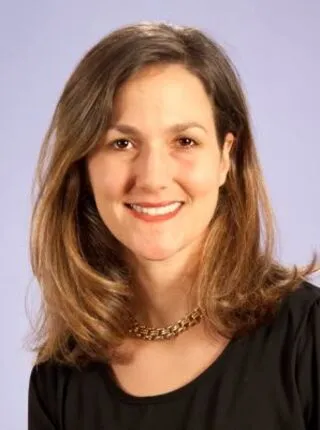Collaborators
Dr. Lindsey Albenberg, DO

Dr. Albenberg is an attending physician in the Division of Gastroenterology, Hepatology and Nutrition, an Assistant Professor of Pediatrics at Perelman School of Medicine at University of Pennsylvania and a member of the research team in the Center for Pediatric Inflammatory Bowel Disease at Children's Hospital of Philadelphia. Her research expertise include Inflammatory bowel disease in adolescents and its transition into adulthood and enteral nutritional therapy for Crohn's disease. Dr. Albenberg completed her medical training at Kansas City University of Medicine and Biosciences, her residency at University of Missouri School of Medicine/Children's Mercy Hospitals & Clinics, and her fellowship in Pediatric Gastroenterology (Co-chief Fellow) at Children's Hospital of Philadelphia.
Dr. Kathleen Kara Fitzpatrick, PhD, FAED

Dr. Fitzpatrick is a licensed psychologist working with children, adolescents, adults and families and has special training working with anxiety, depression, and eating disorders. Prior to her time in private practice, Dr. Fitzpatrick was an academic researcher at Stanford University LPCH's Eating Disorders and Bariatric Surgery Clinics in the Department of Psychiatry. Her research focused on clinical treatment evaluations for eating disorders, including treatment development, training, and dissemination as well as neuropsychological functioning associated with eating disorders, malnourishment, and changes in weight. Dr. Fitzpatrick holds a PhD in Clinical Psychology from The Ohio State University and completed her Post-Doctoral Fellowship at Stanford University School of Medicine.
Dr. John Herrington, PhD

Dr. Herrington is an Assistant Professor in the Department of Child Psychiatry and Behavioral Science at the Perelman School of Medicine. Dr. Herrington joined CHOP’s Center for Autism Research (CAR) in 2008, and is the Associate Director of CAR’s Developmental Neuroimaging Program. His work concentrates on social and emotional information processes among children with autism spectrum disorder (ASD), with a particular emphasis on the co-occurrence of anxiety disorders in ASD. His research examines the problem of anxiety in ASD across multiple levels of analysis, from neurobiological systems to diagnostic assessment. He recently completed one of the largest studies to date implementing formal diagnostic assessment of anxiety disorders in children with ASD. While a graduate student at the University of Illinois and postdoctoral fellow at the Yale Child Study Center, Dr. Herrington received multiple NIH fellowships in developmental neurobiology, cognitive psychophysiology and statistical methods. He is also a practicing clinical psychologist using psychotherapy to treat anxiety disorders among children with developmental and intellectual disabilities.
Dr. Julia Hormes, PhD

Dr. Hormes is a clinical and health psychologist and the director of the Health Behaviors Laboratory at the University at Albany. Dr. Hormes’ research interests include (1) the psychology of human food choice, with a focus on the study of food addiction, food cravings (in particular during the perimenstrum, pregnancy and migraine prodrome), and food avoidance (e.g., of meat and other animal products), (2) interventions targeting diet and nutrition, and (3) non-substance/behavioral addictions, e.g., to online social networking and video game uses. Dr. Hormes is a licensed psychologist in New York State and her clinical interests are in addiction, HIV/AIDS, psycho-oncology, eating disorders, and obesity. Dr. Hormes holds a B.A. in psychology from Princeton University and a Ph.D. in clinical psychology from the University of Pennsylvania, where she worked with her graduate advisor Dr. Paul Rozin. She completed her clinical internship at the University of Mississippi Medical Center in Jackson, MS and continued on to a postdoctoral position at the NIAAA-funded Comprehensive Alcohol Research Center at Louisiana State University Health Sciences Center in New Orleans, LA. Dr. Hormes joined the clinical faculty at the University at Albany in 2012.
Dr. Emily Kuschner, PhD
Dr. Kuschner is an assistant professor of psychology in psychiatry at the University of Pennsylvania. She leads her program of research at the Center for Autism Research at CHOP where her group is aiming to understand food selectivity in children, adolescents, and adults with autism spectrum disorder (ASD). She developed the BUFFET Program (Building Up Food Flexibility and Exposure Treatment), a group treatment targeting improved food selectivity. Dr. Kuschner's additional projects examine the best ways to measure food selectivity and the relationship between food selectivity and nutrition profiles in children with ASD. She is also a psychologist in the Lurie Family Foundations Magnetoencephalography Center where she supervises and conducts clinical and diagnostic evaluations for research participants. She also works closely with Timothy Roberts, PhD, and his team to develop clinical support protocols to help children participate in research studies involving MEG or MRI imaging visits, regardless of age (infancy through adolescence) or cognitive and language levels (nonverbal or minimally verbal through verbally adept).
Dr. Carrie McAdams, MD
Dr. Carrie McAdams is an Associate Professor of Psychiatry at UT Southwestern Medical Center. Her current research examines the connections between biological and psychological aspects of eating disorders using functional neuroimaging. She has focused on understanding the neurodevelopmental changes related to identity formation and social cognition, which are important for long-term psychotherapeutic interventions in eating disorders. She has received fellowships from both the American Psychiatric Association (2010) and the Academy for Eating Disorders (2011). She received an honorable mention for the 2015 Klerman prize, for her work in deciphering the neural traits related to adolescent anorexia nervosa. Dr. McAdams’ clinical and research expertise is in eating disorders, and she works closely with both the adult Eating Disorder Program at Texas Health Presbyterian Hospital of Dallas and the Children's Medical Center Eating Disorder program.
Dr. Lucy Serpell, PhD, DClinPsy

Dr. Lucy Serpell, PhD, DClinPsy Website
Dr. Serpell is a clinical psychologist at the University College London and leads the Eating Disorders Research Group in the Department of Clinical, Educational and Health.. Dr. Serpell's research interests are focused on eating disorders, restrictive eating and dieting in children, adolescents and adults. Dr. Serpell conducts research into the neuropsychology of perseverative behavior/thinking in anorexia nervosa and in fasting states such as 5:2 dieters. This research aims to discover what impact food restriction may have on neurocognitive processing. She has an interest in improving outcomes for eating disorders and collaborates on treatment trials into psychological therapies for eating disorders to help develop better treatments. More recently, Dr. Serpell has begun collaborating on research into the links between anorexia nervosa and autism. Individuals with anorexia nervosa have an increased risk of having comorbid diagnosis of autism. Her research aims to understand more about how anorexia nervosa presents in women with autism and how treatment may be adapted. Dr. Serpell received her BA in Psychology and Philosophy from University of Oxford and her PhD and Doctorate in Clinical Psychology in Psychological Approaches to Health from University of London.
Dr. Benjamin Yerys, PhD
Benjamin E. Yerys, Ph.D., is a child psychologist in the Center for Autism Research (CAR) at the Children’s Hospital of Philadelphia. Dr. Yerys leads CAR’s research on the brain basis and treatment of attention and executive function. Dr. Yerys has published extensively on the presence of executive function impairments in children with ASD, and how they relate to core repetitive behavior symptoms of ASD or common co-occurring disorders like ADHD. Dr. Yerys’ goal is to use this information to inform or create new treatments that can be tailored specifically to the needs of individual children. Dr. Yerys also conducts similar research in other neurodevelopmental disabilities (ADHD) and genetic disorders (22q). Dr. Yerys research has been funded by the National Institute of Mental Health and private foundations (Philadelphia Foundation, McMorris Foundation). Dr. Yerys conducts evaluations for children and adolescents suspected of an ASD at the Outpatient Clinic of the Department of Child and Adolescent Psychiatry and Behavioral Sciences.

